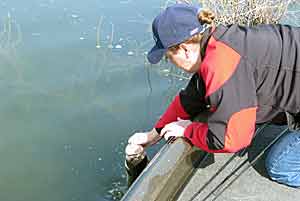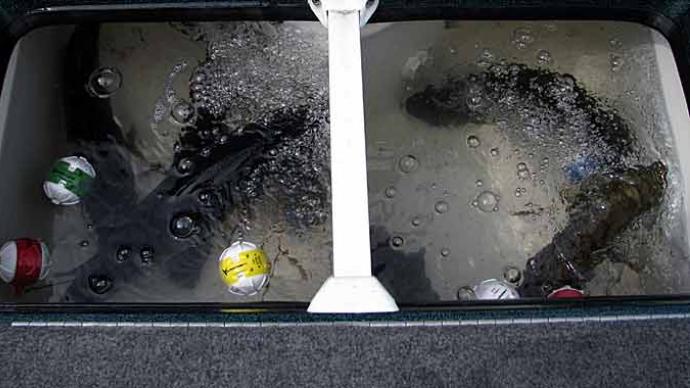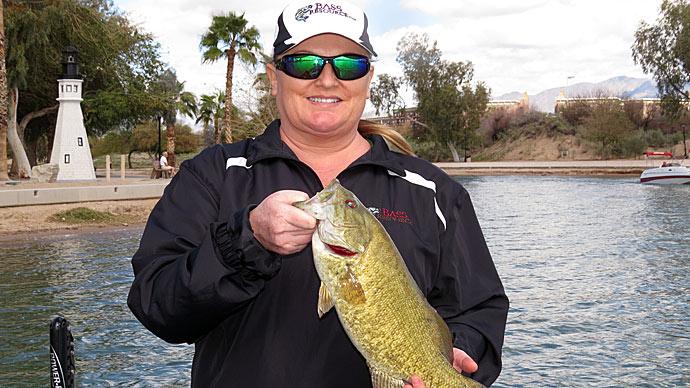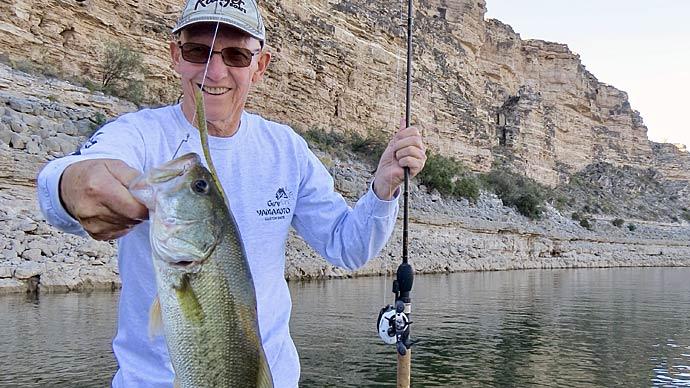
The tracking program proved, without a doubt, that catch-and-release fishing works. Each time we re-caught a fish to change batteries in their transmitters and check the health and weight of the fish, it reinforced this fact. Of course, we know that it doesn't always work. When fish are not handled properly as they are held in captivity of a livewell, they can suffer stresses they cannot recover from and, even though released, die anyway. But most released fish can survive very well if given just a little extra care.
Some fish in our tracking program were caught and released many times during the study. They appeared not to suffer any ill effects from this. But we always handled them quickly and carefully to ensure the best stress-free release we could. Wanda, the first fish in the study, was probably handled more in the years we tracked her than most fish ever are, but until she was caught by an angler who kept her for a trophy, she continued to thrive and grow each time we re-caught her and checked on her.
If you are fishing tournaments and holding bass in your livewell for eight or more hours, it only takes a little extra effort to release a fish that will survive. Most anglers do pretty well because the bass in our lakes almost all have hook marks from being previously caught.
Because tournament season is in full swing, and we are getting to that part of the year when survival for tournament-caught bass becomes critical, I'd like to go over a few easy steps for live release. As the summer months come, so does the summer heat, which is very hard on bass in your livewell. Most responsible tournaments try not to hold events during the hottest times of the year, and many bass clubs will go to night tournaments to beat the heat for the anglers and the fish. But even in the heat, you can do a few simple things to ensure the bass you release will survive.
Most important this time of year is to keep the water in the livewell cool. You can make small ice bottles to carry in your ice chest and use them one at a time. Just a few degrees of temperature can make a big difference at the end of the day. A livewell becomes an oven with the summer sun beating on it all day. And run the aerator constantly. This is a big plus for the fish, but they'll need some fresh water, too. Don't just recirculate the water all day - release water from the livewell and replace it with fresh every few hours.
This works for you, but you won't be able to say you are a catch-and-release fisherman if you release fish that will only die later and have done nothing to help them. By entering a tournament and winning money by using the fish, you have an obligation to do all you can to release them alive.
Be sure to use Please Release Me all the time, not just during the summer. This product and others like it help fish a great deal. Some people are now adding non-iodized salt to this, which TPW and other fisheries have used for years when handling and transporting fish. Instructions for using salt can be found in my book, and Honey Hole provides free fish care information to anyone who sends a self-addressed, stamped envelope to the main office. But it's easy to do; 1/4-pound per five gallons of water should be used. You can mark off the number of gallons in your livewell by adding five-gallon buckets of water one at a time and using a permanent marker to mark the water line. So that at any level, you'll know how much to use. Salt helps to kill bacteria and restore electrolytes. It is safe and inexpensive.
A couple of other suggestions are to learn how to deflate the air bladders of fish that appear unable to get down, are rolling over and over, or lying on their sides at the water's surface in the livewell. This information is also provided with the fish care package mentioned before.
TPW suggests not playing a fish to exhaustion and several other things like not sticking your fingers in the gills, keeping them in the water as much as possible, and treating them gently. This means not throwing them back into the lake but easing them gently in. It also means don't rip hooks out, but try to dislodge them as carefully as possible (back of the barb without ripping up the fish).
Most of this is common sense, but because a fish isn't warm and cuddly like a little puppy, people tend to forget that they are vulnerable to misuse or abusive handling. Even the fish you plan to retain for the table shouldn't be mistreated. TPW now says that not all bass should be released. Anglers need to begin keeping a few now and then for the table so that our lakes remain healthy. You don't have to be as gentle with the ones you intend to keep as with those you intend to release, but practice makes perfect, and treating all fish the same will keep your handling practices in tune.
Most tournaments require live release, so do the right thing by the fish you keep to weigh in. Once you've paid your entry fee, could you do your part to make catch-and-release real?




